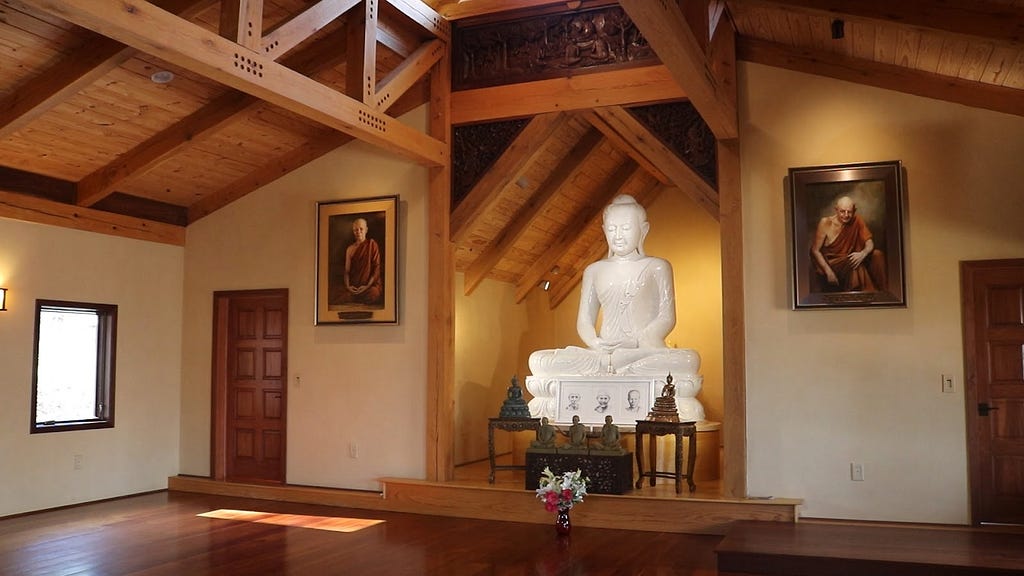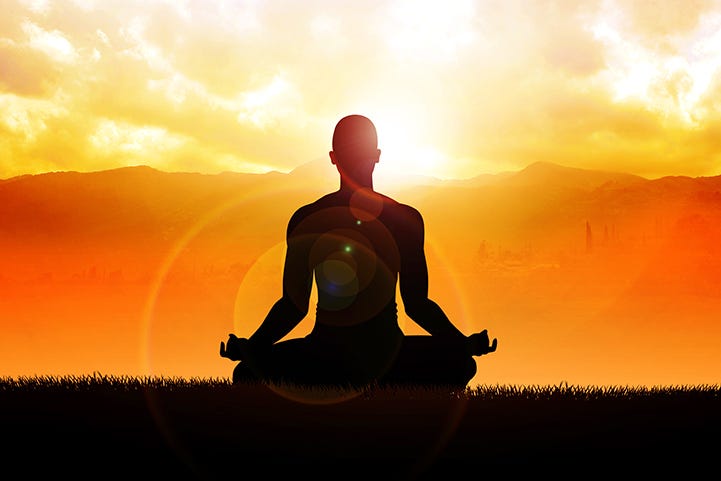By Carter Nielson

A Useful Tool That Aids In Battling Stress, And Enriches Your Spiritual Life
Here at Southern Virginia University, a vast majority of the student body are members of The Church of Jesus Christ of Latter-day Saints. For those unaware, the previously mentioned religion is a small sect within the Christian faith; the members of this religion are stalwart in their faith and usually adhere strictly to their doctrine. While not a member of any religion myself, I appreciate and respect all faiths, admiring the followers of various religions for their integrity and commitment to be part of something greater. However, throughout the last couple years in personal discussions with religious friends I have, it has been made clear that a lot of these faithful people have been unsatisfied with their own level and depth of spirituality. It has made me, as a non-religious person, wonder what is missing in my friend’s lives, and what can be done for those who depend on their religion to strengthen their spirituality. During my time here at Southern Virginia as a philosophy major, I have been very interested in the relationship between spirituality and religiosity. I think that without a doubt they are inseparable. However, that doesn’t particularly mean that they are the same thing or that one cannot be spiritual without religion. A religion with teachings that I have found particularly helpful are those of the Buddhist tradition.

The Origins of Meditation
Buddhism is a religion of particular interest regarding the matter of spirituality, and one that many people could learn a lot from if they seek to enrich their spiritual side.
Buddhism is an ancient religion, beginning around 2,500 years ago.
In many sects, Buddhism is non-theistic: the absence of beliefs in God or a higher power. This shouldn’t startle anyone, as the point of these non-theistic religions is to focus the energy and mind of the individual on self-enlightenment (reaching the highest level of spirituality one can in this life). I have found that many teachings from the Buddhist tradition are extremely applicable and practical to anyone seeking to enrich their spiritual life. One of the practices that Buddhism teaches is meditation, an exercise that teaches those who practice it to find balance and peace in their life. This practice is non-denominational and doesn’t even belong exclusively to Buddhism; meditation has been a common practice in countless cultures and societies since prehistoric times.

Journey To The Monastery
Recently, fellow student Will Dryden (’23) and I went to the Forest Dhamma Monastery located here in Rockbridge County. During our visit, the monks were generous enough to allow us to sit in one of their daily religious rituals in which they chant the Eight Mahayana Precepts. These precepts are the rules that followers and monks of the sect of Buddhism found at the Forest Dhamma. The precepts are meant to promote a better life, while the monks of the Tibetan Buddhist religion follow the precepts in a more strict manner. Their purpose is to assist them in achieving enlightenment. After the precepts, we were able to talk with one of the monks who lives at the monastery, Khubra Chris. I asked him a few questions about meditation, its practicality in the life of a college student, how he thinks that meditation can help aid in spiritual growth, and some tips on how to set oneself up for successful meditation. Our trip to the monastery and the conversation with Khubra Chris was a great experience, so we decided to film it so you all can be included in the knowledge we gained too.
Our trip to the Forest Dhamma Monastery:
How To Meditate
If you were to not read a single word of this article and only listen to Khruba Chris’s wisdom, there would probably be little difference between what you gain. But, let’s go over what Khruba Chris said. In order to meditate we need to:
- Find your meditation object. A meditation object can be anything, you can chant, breathe, repeat a mantra in your mind. The most common object is the breath.
- Then you need to focus on the object, in this case you focus on your breath going in and out. As Khruba Chris instructed, be mindful of the breath entering and filling your body, and then the sensation of it leaving your body.
- As you meditate you will inevitably become distracted, and that’s okay. Recognize the distraction and bring your awareness back to the object of your meditation.
- Rinse and repeat for your intended duration.
Note that I did not specify that you need to be sitting, or sit cross legged with your fingers pinched together. Sitting during meditation does help, as it improves focus and enables good breathing, but it isn’t necessary. The most important part of meditation is the mental focus. The Buddha himself was known to do walking meditation, if that sounds more your style go for a walk and focus on your breathing.
Sometimes, I put on peaceful and relaxing music to mute out the noise of my house or cars driving by. Here are some playlists that I have found helpful during meditation:
It’s important to note what Khruba Chris said about how meditation isn’t an easy thing to do. This practice forces you to realize things that are bothering you on a subconscious level (this can be a little daunting at times). Once these habits and tendencies are seen, they can’t be unseen. But just as meditation is the way we recognize these obstacles, it is also the tool we can utilize to overcome them through mental clarity, and spiritual growth.
As Khubra Chris stated, the practice of meditation is not only beneficial for those seeking to enrich their spiritual life, but an extremely useful tool in finding mental equilibrium. It is safe to assume that anybody could benefit greatly from an increase in mental clarity. I often find myself so overwhelmed with school that I can’t even stop to think about my own mental state. After my experience at the monastery, though, I am planning on starting a more structured meditation routine to help battle the stresses that are inherent in the average college experience.

Meditation’s Benefits Can Come Instantly
It would come as no surprise if even after the instruction in the video and my words of praise that some people would still be apprehensive to try to implement meditation into their lives. So, I asked my best friend Will Edwards (’23), who has no experience in meditation, to give it a try and tell me what he thought about it. Will expressed that he has felt super overwhelmed this semester; he is about to graduate and taking a very heavy credit load, all while working a full-time job. Will told me that when he thinks about school, he feels stressed. Most of the time he doesn’t find himself with a peaceful mindset, unless he distracts himself to forget about his stressors. Sound familiar? It sure did to me. For his introduction into meditation, I went over the tips that Khubra Chris taught in the video, and told him to just sit there and focus on his breathing for about ten minutes.
Ten minutes may seem like a short amount of time, but it was all it took for Will to recognize the power of this old practice. Will walked into my room after his timer went off, and I could tell a difference in his countenance. When we talked about it afterwards, Will said,
It was a powerful experience, I felt a sense of peace that was hard to gain beforehand. Meditation felt like it was teaching me to let go of the stresses of life, and with every breath I felt a little lighter and almost like a weight was lifted off of me.
I was thrilled to see that this wasn’t just a phase I was going through to try and seem cool to others. Meditation actually worked, and it worked for someone very dear to me.
Will also mentioned how he could see how a regular practice of meditation would be beneficial for focus in his daily life, and to have a better ability to prioritize what is important to him. He said,
The things that naturally came to my mind while meditating were things that I should prioritize in my life and direct more energy towards. Also, generally speaking, removing myself from the stress of everything in life was like a reset and helped me realize that the stress of life doesn’t control me. It removed the cloud of stress, which can inhibit people from working efficiently. I do feel less stressed after that.
As I said, Will is a good friend of mine; I see him almost daily. In the days that followed, Will looked inspired and started catching up on a lot of assignments that had been bogging him down. Will also mentioned that he thinks a regular practice of meditation combined with prayer could be a very useful tool in his religious endeavors as a member of The Church of Jesus Christ of Latter-day Saints. The clarity that meditation brings can be a great preparation for communicating with God more clearly, and prepare someone who believes to receive divine guidance with less distracting emotions and thoughts.
Meditation Is A Tool That Aids In Divine Communication
Another member of the church here at Southern Virginia, Jared Smith (’24) had very similar thoughts to Will in regards to meditation and its usefulness in his relationship with God. Jared has been practicing meditation for a while now, and has only positive things to say about how it has strengthened his spiritual journey. He has found that including mediation in his spiritual life has allowed him to ground his body in the present moment, which allows for him to have a holistic take on his religious life. Jared shared:
Some things I have gained from eastern religions are the power of mindfulness. The vein of thought where you focus on perspective, and the outward living mindset where it’s not all about me. I have my place and role in life, and it’s up to me to do the best with that. The alignment of mind, body, and spirit. It fits into our beliefs; the Church teaches that our body is a gift, and these teachings help us respect our body.
Jared is a huge inspiration to myself and to those of any faith that share the goal of this article, which is to enrich our spiritual experience in this life through the practice of meditation. As someone who is not a member of the Church of Jesus Christ of Latter-day Saints, I was pleasantly surprised with Jared’s very positive take on meditation and the knowledge he already had about the practice. He is a prime example of how using this ancient tool can help us calm our minds and prepare our body to receive spiritual growth. If you sit back and think, it should come as no surprise that a practice of which the sole intent is to calm the mind and quiet our thoughts can be so useful in a type of religiosity such as Christianity that focuses on preparing oneself to make a connection with a divine being.

My Invitation To You, Dear Reader
If you couldn’t already tell, I am passionate about meditation. I have struggled with mental health for a long time now, and meditation has been a great companion for me when my racing thoughts start to become more and more loud. Sitting down and just focusing on my breathing has saved me from many horrible days. It has been such a help in my life having this tool in my arsenal to combat tough days and hard situations. Whether you are interested in meditation for the mental clarity and emotional peace it can bring you, or the equilibrium that it invites into the soul and body, meditation can be very useful to you. I invite you to follow the instructions and guidance that Khubra Chris gave in the video, and to give meditation a try. Remember that it can be hard at first to just sit and try to shut off your brain, especially in these busy and turbulent times. I assure you that if you put your mind to it, you can find immense treasures within the practice of meditation.
Find Peace and Purpose Through This Ancient Practice: Meditation was originally published in The Herald on Medium, where people are continuing the conversation by highlighting and responding to this story.






